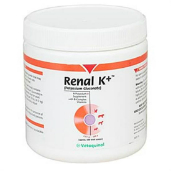The urinary tract consists of the kidneys,
the bladder, the urethra, which is the tube that drains the bladder
to the outside world, and the ureters that connect the kidneys to the
bladder. Unfortunately, urinary tract disease is an all too common
problem for both dogs and their owners.
"The most common symptoms of kidney disease and failure are increased thirst and urination."
Typical Symptoms
The ureters, bladder and urethra are
collectively referred to as the lower urinary tract. Dogs that
suffer from lower urinary tract disease may:
- Have
"accidents"
- Strain to urinate
- Urinate small amounts more
frequently than normal
- Have blood in their urine
Diseases that only affects the lower
urinary tract usually do not produce more generalized symptoms like
loss of appetite, lethargy, a fever, etc.
Causes of Lower Urinary Tract Disease
Following is a brief description of
diseases that commonly affect a dog's lower urinary tract.
They can all produce very similar clinical signs, so a trip to the veterinarian
is necessary to reach an accurate diagnosis and plan appropriate treatment.
Urinary Tract Infection (UTI)

A urinary tract infection (UTI) of the bladder and/or urethra is most commonly diagnosed in
female dogs and is fairly rare in neutered males. A urinalysis and
urine culture is usually necessary to diagnose an infection and to determine
which antibiotic should be used to treat it. Make sure
your dog finishes her entire course of antibiotics because the symptoms
of a UTI often resolve before the infection is completely gone.
If urinary tract infections become a recurrent problem, your veterinarian
will need to look for an underlying cause.
Bladder Stones (Uroliths)
An abdominal x-ray and/or ultrasound usually reveals the presence of
stones in the bladder or urethra. Your veterinarian may be able
identify crystals in the urine under a microscope, which will help
determine what the stone is composed of. Some types of bladder stones
can be dissolved with pet medications or special diets but others need to be surgically
removed. Once the stones are gone, your veterinarian may be able
to recommend special diets or other treatments to prevent their return.
Bladder Tumors
Cancer within the lower urinary tract can usually be diagnosed with x-rays
and/or ultrasound. Bladder cancer is treated with surgery, radiation
therapy, chemotherapy, or some combination of the three.
Anatomical Abnormalities
In some cases, the bladder, urethra and/or ureters may not have developed
normally, and this can cause the symptoms associated with lower urinary
tract disease. X-rays take after the administration of a contrast
agent and/or ultrasounds should pick up the abnormality and surgery
is usually required to correct it.
Kidney Failure

Kidney or renal failure can be divided
into two big categories. Acute kidney failure develops rapidly
as a result of infection, toxin ingestion (e.g., antifreeze), etc.,
and dogs can recover with fluid therapy, dialysis, and other treatments
if the damage to their kidneys is not too severe.
Chronic kidney
failure is caused by the more gradual loss of kidney function and cannot
be reversed. The most common symptoms of kidney
disease and failure are increased thirst and urination. However it can often be managed for a period of time with fluid
therapy, prescription diets and and kidney health supplements and medications. A kidney transplant
may also be an option in some cases.
The above is provided for information purposes only and should not be used for the diagnosis or treatment of any condition.
This information does not cover all possible variables, conditions, reactions, or risks relating to any topic, medication, or product and should not
be considered complete. Certain products or medications may have risks and you should always consult your local veterinarian concerning the treatment of
your pet. Any trademarks are the property of their respective owners.